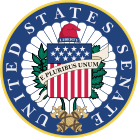United States Senate Special Committee on Aging
Appearance
(Redirected from U.S. Senate Special Committee on Aging)
This article needs additional citations for verification. (November 2013) |
| Special Committee | |
|---|---|
 United States Senate 118th Congress | |
| History | |
| Formed | February 13, 1961[1] |
| Leadership | |
| Chair | Bob Casey (D) Since February 3, 2021 |
| Ranking member | Mike Braun (R) Since January 3, 2023 |
| Structure | |
| Political parties | Majority (7)
|
| Website | |
| https://www.aging.senate.gov/ | |
The United States Senate Special Committee on Aging was initially established in 1961 as a temporary committee; it became a permanent Senate committee in 1977. As a special committee, it has no legislative authority, but it studies issues related to older Americans, particularly Medicare and Social Security.[2]
Prior to the passage of Medicare, the committee was studying health care insurance coverage for elderly American citizens. The committee conducts oversight of the Medicare program, Social Security and the Older Americans Act. Some of the issues that have been examined by the committee include unacceptable conditions in nursing homes, protection from age discrimination, and pricing practices for prescription drugs.[2]
Members, 118th Congress
[edit]| Majority[3] | Minority[4] |
|---|---|
|
|
Historical rosters
[edit]115th Congress
[edit]| Majority | Minority |
|---|---|
|
|
116th Congress
[edit]| Majority | Minority |
|---|---|
|
|
117th Congress
[edit]| Majority | Minority |
|---|---|
|
|
Chairperson
[edit]- Patrick V. McNamara (D-MI), 1961–1963
- George Smathers (D-FL), 1963–1967
- Harrison A. Williams (D-NJ), 1967–1971
- Frank Church (D-ID), 1971–1979
- Lawton Chiles (D-FL) 1979–1981
- John Heinz (R-PA), 1981–1987
- John Melcher (D-MT), 1987–1989
- David Pryor (D-AR), 1989–1995
- William Cohen (R-ME), 1995–1997
- Charles Grassley (R-IA), 1997–2001
- John Breaux (D-LA), 2001[5]
- Larry Craig (R-ID), 2001[5]
- John Breaux (D-LA), 2001–2003
- Larry Craig (R-ID), 2003–2005
- Gordon Smith (R-OR), 2005–2007
- Herb Kohl (D-WI), 2007–2013
- Bill Nelson (D-FL), 2013–2015
- Susan Collins (R-ME), 2015–2021
- Bob Casey Jr. (D-PA), 2021–present
See also
[edit]References
[edit]- ^ "U.S. Senate. Special Committee on Aging. (2/13/1961 - )". National Archives Catalogue. Retrieved 1 July 2024.
- ^ a b "About the Aging Committee". U.S. Senate Special Committee on Aging. Archived from the original on January 31, 2007. Retrieved October 14, 2005.
- ^ S.Res. 30 (118th Congress)
- ^ S.Res. 31 (118th Congress)
- ^ a b Pursuant to S.Res. 7 John Breaux served as chairman from January 3, 2001 until noon on January 20, 2001. Larry Craig served as chairman from noon on January 20, 2001 until June 6, 2001.
External links
[edit]
